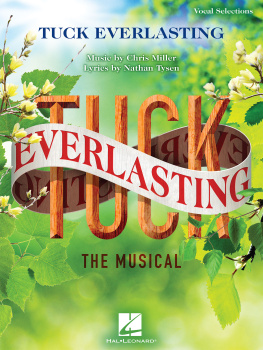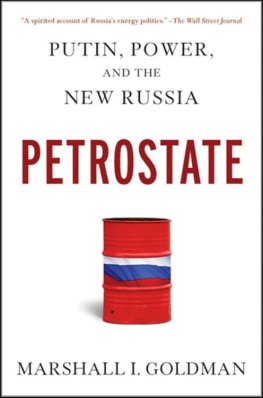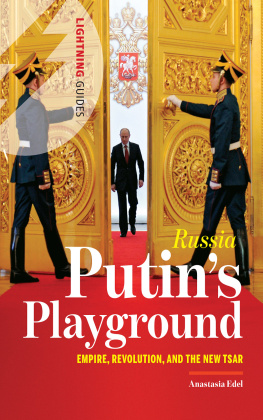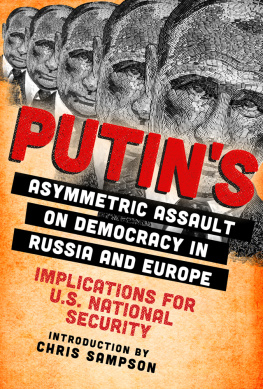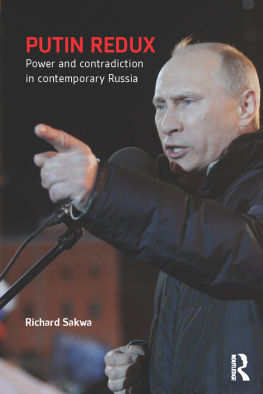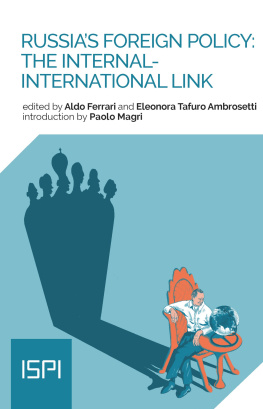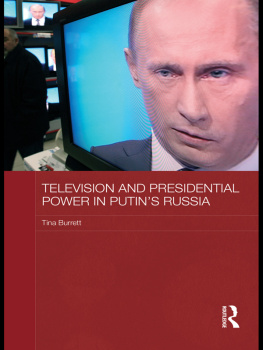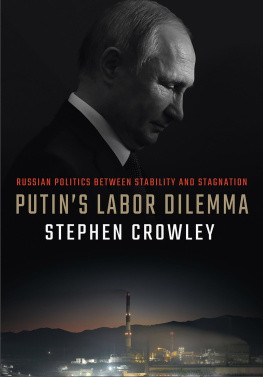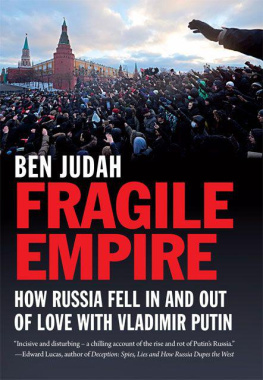The University of North Carolina Press has been a member of the Green Press Initiative since 2003.
Names: Miller, Chris, author.
Title: Putinomics : power and money in resurgent Russia / Chris Miller.
Description: Chapel Hill : University of North Carolina Press, [2018] | Includes bibliographical references and index.
Identifiers: LCCN 2017042863 | ISBN 9781469640662 (cloth : alk. paper) | ISBN 9781469640679 (ebook)
Subjects: LCSH: Russia (Federation)Economic policy1991 | Russia (Federation)Economic conditions1991 | Russia (Federation) Politics and government1991 | Elite (Social sciences)Russia (Federation) | Putin, Vladimir Vladimirovich, 1952 | PresidentsRussia (Federation)
Classification: LCCDK510.76 .M56 2018 | DDC 330.947dc23 LC record available at https://lccn.loc.gov/2017042863
FIGURES AND TABLE
Figures
Russian government budget balance as percentage of GDP, 19922000
Russian oil production, 19922016
Russian oil and gas tax revenue as percentage of total government revenue, 19992014
Russian external sovereign debt as percentage of GDP, 19982007
Oil prices, 19992007
Russian consumer price inflation, 19952005
Actual oil prices vs. prices forecast in government budgets, 20002008
Russian government revenue and expenditure, 2016
Russian government pensions, percentage change per year, inflation-adjusted, 19942015
Russian wage growth, percentage change per year, inflation-adjusted, 19942015
Russian wage growth vs. labor productivity growth, 20002012
Russian military spending as percentage of GDP, 19922008
Russian military spending as percentage of GDP, 20052014
External (foreign) lending to Russian banks and corporations, 20042008
External lending to Russian banks, 20082009
Russian foreign exchange reserves and exchange rates, 20082009
Budget balance excluding oil and gas revenue as percentage of GDP, 20062014
Private capital inflows, 20052013
Foreign exchange reserves and exchange rates, January 2014January 2016
Financial sector external (foreign) debt, 20132015
Quarterly private capital inflows, 20002007
Quarterly private capital inflows, 20132015
Table
Reported obstacles to Russian business, 2000
PREFACE / THE STRONGMAN ECONOMY?
There are two absolutely very well-known historical experiments in the worldEast Germany and West Germany, and North Korea and South Korea. Now these are cases that everyone can see!
The Kremlins wars in Ukraine and Syria and its attempt to reconstruct the sphere of privileged interests that Russia lost when the Soviet Union collapsed have only heightened the popular sense that Vladimir Putin and the Russian elite are dead set on building the Soviet empire anew. In economic terms, many people think, Russias failings since Putin came to power in 1999 mirror the dysfunctions of the Soviet economy. Ask a typical person their impressions of Russias economy and words such as corruption, kleptocracy, and petrostate come to mind.
These descriptions get much right. The policy failures and missed opportunities of the past two decades are plentiful. Whole books are devoted to exposing the corruption of Russias rulersand indeed they are corrupt. These critiques of contemporary Russias political economy are levied by foreigners and Russians alike, and not only by those Russians who support the opposition. The economic problems Russia faces are real, and many are self-inflicted.
Yet neo-Soviet it is not. Today, Russias state plays a large role in the economy, but unlike in the Soviet period, the Kremlin only dominates certain sectors, leaving others alone. Nor is the story solely of mistakes and failures: things could well have been worse. Indeed, from the perspective of 1999, when Putin came to power and began forging the centrally managed political system that governs the country today, Russias economic performance has exceeded most expectations. There was some optimism about the independent Russia that emerged from the wreckage of the USSR in 1991, but during the subsequent decade everything seemed to go wrong. The countrys agricultural sector sank into depression. Much of the consumer goods industry went bankrupt. Industry did relatively better only because it was sustained by government subsidies that fueled inflation, wiping out many Russians savings. By the end of the 1990s, the optimistic expectations that Russia would develop a new, capitalist middle class seemed, to most observers, naive. The most visible new class was that of the oligarchs, whose corrupt business dealings were the main news story of the 1990s.
By the time of the 1998 financial crash, when Russia defaulted on its debt and the ruble collapsed, foreign and domestic observers alike had downgraded their expectations of what Russia could achieve. In 1991, some analysts hoped Russia could become a normal European country. In 1999, the most optimistic interpretation was that Russia had become a normal emerging market. And that was the good news!
Perhaps the post-1998 gloom was unduly negative, unrepresentative of what realistically should have been expected from Russia? Perhaps a better metric would be to find a country that looked like Russia in 1999 and compare its development. A middle-income country. A country in which oil rents constituted at least 1015 percent of GDP and all natural resource rents constituted around 20 percent of total output. A country in which a young lieutenant colonel took power in 1999, committed to using the security services to bolster his power. A president who claimed the mantle of democratic legitimacy in part based on his ability to force big business and oligarchs to follow his rules, whether by means fair or foul.
One need not invent a country that in 1999 looked so like Russia. It exists in Chavista Venezuela: still governed by an autocratic regime, still dependent on declining oil revenues, still failing to build an economy based on rules rather than political whim. The difference is that the Chavistas spent recklessly during the oil boom while presiding over a mismanagement-induced collapse in oil production and, now, painful shortages of consumer goods created by poorly conceived price controls.
Surely no one could have reasonably expected Russia to turn out like Venezuela today? In fact, in 1999, some observers thought Venezuela was better placed to prosper. At the time, credit rating agencies judged it safer to lend to Venezuelas government than to Russias. The economic problems we currently associate with Venezuelaconsumer good shortages, runaway inflation, and military-enforced food requisitionswere the story of Russias twentieth century. There was little reason in 1999 to think that this sorry history would not persist into the twenty-first century. Today few people compare Russia and Venezuela. That is because the two countries lieutenant colonels had very different methods. The Chavista experiment is widely recognized as a failure, but under Putin the Kremlin has consolidated power at home and abroad.
The aim of this book is to explain the Kremlins economic strategy and to assess whether it has succeeded in achieving its aims. Since the beginning of the Putin era, Russias leaders have had the following goals, in order of priority: maintaining power, expanding Russian influence abroad, and developing Russias economy at home. To achieve these goals, the Kremlin has implemented a three-pronged strategy:


